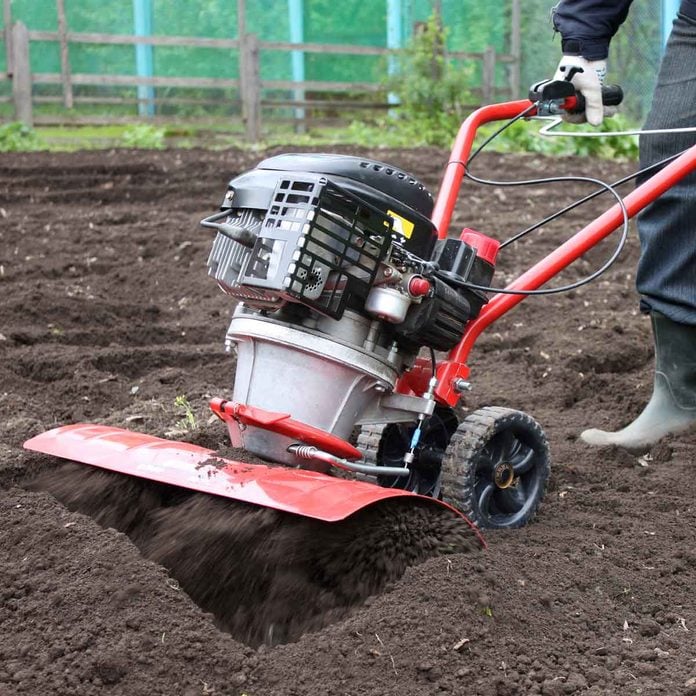Should You Buy or Rent a Garden Tiller?
Updated: Jan. 25, 2022

Tillers are tremendously useful tools for home gardeners. But tilling is not an everyday task. So is it better to buy or rent a garden tiller?
Our editors and experts handpick every product we feature. We may earn a commission from your purchases.
Garden tillers are popular power tools for home gardeners. A tiller’s spinning metal blades churn and loosen the soil, making it easier for your soil amendments to penetrate, your gardening tools to dig and your plants to absorb nutrients and thrive.
But tilling a garden isn’t a weekly task like mowing the lawn. And depending on its size and power, a tiller can be a hefty investment. Fortunately, garden tiller rental is an option. So the question for homeowners is, should you buy a tiller or simply rent one?
On This Page
Pros and Cons of Garden Tiller Rental vs. Buying
Buying a Garden Tiller
Pros:
- Easy access;
- Less costly in the long term.
Cons:
- Higher up-front cost;
- Maintenance;
- Aging equipment.
Renting a Garden Tiller
Pros:
- Lower entry price;
- No tool storage issues;
- No annual maintenance.
Cons:
- Condition depends on the last user;
- Availability varies;
- Usage window varies with rental policies;
- Must be transported to and from the rental facility;
- Long-term costs often more expensive than buying;
- You break it, you bought it.
Garden Tiller Rental vs. Buying: The Costs
For many gardeners, the biggest initial question is cost. So let’s look at the basic calculation.
Rental cost = Price of rental + gas + transportation.
- The price of the rental will vary by rental facility and the size of the tiller. For mid-range tillers, you can expect about $45 to $65 per day.
- Gas usage also varies, but for a gas-powered tiller, you should plan on using about a tank’s worth of fuel per day. For mid-size tillers that’s usually two gallons or less.
- Depending on your vehicle and the distance to the rental facility, transportation of the outdoor power equipment might be a major process.
Buying cost = Purchase price + gas + maintenance.
- There’s a huge range in the initial purchase price of tillers. If you’re looking at a mid-range model like this Mantis, the purchase price will likely be $300 to $400, compared to a two-day rental price of $110.
- Gas usage for a tiller is minimal. Two-cycle engines require an oil/gas blend, while four-cycle engines use regular gasoline. Either way, you’re unlikely to use more than a gallon or two during a work day.
- Electric tillers have low maintenance, but gas-powered models need to be tuned up occasionally. See this tiller maintenance guide from Troy-Bilt for a better idea of what’s involved in tiller maintenance. If you take your tiller in to a service center, expect to pay around $75 for an annual tuneup.
How to Choose Between Garden Tiller Rental vs. Buying
Price is important, but far from the only factor. You’ll need to find the balance between price and convenience. How often will you use the tiller? How much space do you have for storage? How important is convenience to you? Do you have a major plot of land or a little patch of garden?
It’s a good idea to make a pros and cons list of your own, so you can see the benefits and costs before you make a decision. Use the actual cost of the tiller you’re considering buying and the cost to rent a comparable tiller in your area for your calculations.
What About a Co-Op?
In a co-op arrangement, two or more people pool their money to purchase an item such as a tiller, then share its use.
Pros:
- A great way to have access to a tiller for a low buy-in cost.
- Neighborhood co-ops make it easy to walk next door and get the tiller.
Cons:
- If you have to drive across town to a friend or family member’s house, it may be more trouble than it’s worth.
- Seasonal yard tools such as tillers will be in demand by all members of the co-op at the same time.
- The condition of the tool will depend on the other members, who may or may not care for their tools properly.
Where to Buy a Garden Tiller
You can find a selection of tillers at home improvement stores such as Lowe’s, The Home Depot or Ace Hardware, as well as general big box stores like Walmart. Many cities also have dedicated lawn and garden equipment retailers that are a great resource for getting a hands-on feel for the tiller.
Garden tillers can also be bought online, but be sure to check the return policy. Online discounts are great, but it’s hard to know if the machine is right for you without seeing it in person. And be sure to note the delivery cost.
How to Rent a Garden Tiller
- Find a rental location. A hardware store, lawn mower sales or repair shop, home center or equipment rental centers are great places to look.
- Make a reservation to pick up the tiller, online or by phone.
- Arrange transportation. Use your own vehicle or borrow one if a tiller won’t fit in yours. Lay down a tarp or plastic to protect the vehicle from the tiller. Bring Bungee cords or straps to secure the tiller for the ride home.
- Show up on time for the rental pick-up and have them go over any operating instructions. Ask questions.
- Pack up the tiller, head home and get to work!
- Keep an eye on the time and make sure you get the tiller back before the deadline to avoid a late fee.